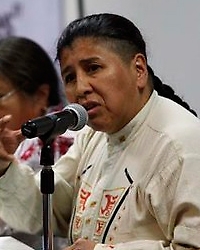What are Commons? Why select this topic for the International Transform Conference in Copenhagen, March 2017?
The commons and the common goods are under pressure of privatization. Therefore the fight for commons is a political principle, and the discussion of the ownership, equal rights and access to clean air, water and earth is crucial – for being able to enjoy these resources collectively. A discussion of commons is about the government of our common resources and it is about responsibility for the climate systems and a planning of our common future.
|
|

Satoko Kishimoto,Holland Reclaiming public service as commons
|
Aaja Chemnitz Larsen/Jens Heinrich Exploitation-of-minera-resources-in-Greenland
|
 Sukhgerel Dugersuren, Mongolia, Executive Director of Oyu Tolgoi Watch Sukhgerel Dugersuren, Mongolia, Executive Director of Oyu Tolgoi Watch
|

Chantal Delmas, France, |
 Fred Freundlich, Faculty of Business, Mondragon University in the Basque Country of Spain. Fred Freundlich, Faculty of Business, Mondragon University in the Basque Country of Spain.
|
 Julieta Paredes Julieta Paredes
|
Commons can be described and categorized according to ownership and content:
| Local and regional | Global | Intellectual property and immaterial | |
| Private owned property | E.g. natural resources, forest and roads with public access | ||
| Self-organized and collective owned commons | E.g. Property and production facilities | Free knowledge | |
| Public ‘property’ | e.g. Forests, coast lines, water, public services. Law regulated items | Climate systems, ozone layers, oceans, biodiversity | Law regulated items |
Pierre Dardot and Christian Laval wrote in ‘The Enigma of Europa’ (Transform Report 2016) ‘commons’ cannot be reduced to state-owned, but rather defined as a positive political alternative to neo-liberalism reason oriented to completion, that allow us the duality of public/state property versus private property.
The challenges regarding private commons occur when the economic interests and the interest of individuals clash the benefit of a group, the environment or the society. It could be: (1)the use up of resource, (2) Favors of some use on expense of others (eco system), (3) Commoditization of resource may and often leads to negative externalities (land degradation, species extinction, climate change), (4) Based on discussions of exclusion, boundaries and limits the access or rights to use.
The challenges regarding public property can occur because of the inability to win collisions which can lead to status quo and doing nothing; susceptibility to claims and well organized or powerful interest and/or it seems easier to make a cost/benefit analysis and set a price of the initiatives of regulations and the limitation of use, than it is to set a price on the effect of the destroyed atmosphere. It might seems easier to calculate the price of new initiative to prevent the pollution, and as the price can be quite high, it might seem more reasonable not doing anything, as the price of doing nothing can be hard to calculate and is therefore not available for comparison.
The air (our atmosphere) is really the quintessential commons, and examples of misuse of air are ozone holes, smog in Paris or Beijing and the consequences of climate changes that affect all human and living beings. Likewise is the responsibility of water, our drinking water and the water for crops, trees and domestic and wild animals. Ownership, access and power to defend the source of water are essential for life.
One of the success criteria of commons is trust – trust in action and trust in information. The aim of the conference is to share experiences and empirical and to discus alternative to private ownership.
Test your understanding of commons’ theory with a question (source: tragedy.sdsu.edu).
Assume that there are several people on a boat in a lake or ocean. All of a sudden, one of them goes crazy, pulls out a drill and starts drilling a hole in the hull. The rest have three choices:
- Watch the drilling and examine how fast the driller makes a hole in the hull
- Grab a life jacket an jump out of the boat, because it is obvious that the boat is going to sink eventually
- Stop the culprit and throw the drill overboard to avoid the repetition of such an unfortunate incident.
If your answer is A, you do not know that the boat is actually a commons, so you fail the test. If your answer is B, you know that the boat is a commons, but you do not know that it is ‘your’ commons, so you fail, too. If you answer is C, you know that the boat is a commons and you are ready to defend its integrity, because your security and comfort (to say nothing about your life!) depends on it.
For further inspiration:
- The Common: An Essay on the 21st-Century Revolution http://www.transform-network.net/publications/yearbook/yearbook-2016/news/detail/Journal/the-common-an-essay-on-the-21st-century-revolution.html)
- Governing the Commons for two decades: A complex story https://www.thecommonsjournal.org/articles/10.18352/ijc.325/

